My writing rituals
In way too much detail.
The result of my experiment, “what do you want me to write next” was that there were three requests for stories you wanted me to write, and only one person voted on them (Austin and I were the other two votes!).
I think if it were a native feature of Substack, having you vote on what you wanted me to write might have worked better. But it was worth trying for all of your input alone and I am so grateful to Austin for building this prototype so we could test it out!
In any case, I would like to write the winning story: Austin’s request for the intimate details of my writing life. And because, when I asked what you wanted me to include in this article in my private community, you gave me several ideas, I’m framing it as a Q&A so I can make sure to cover them all. Here we go.
Austin: I'd really like to read an in-depth breakdown of your writing routines, both for your novels and your newsletter essays.
I wake up at 6am every morning regardless of what time I go to bed or whether I have an alarm set—c’est la vie! I run a bath in my clawfoot tub, adding salts for my muscles and oils for my mood (Frankincense or Eucalyptus depending on whether I’m looking for decadence or to unstuff my sinuses—I live in Utah, it’s a desert!
I spend about an hour reading Substack in the bathtub—I don’t look at the notifications yet, I just read. I subscribe to about 100 newsletters at any given time and read them via the app. I’m an easy subscribe, but also an easy unsubscribe—I’ll sign-up for any writer with an intriguing bio, but I only keep the ones I fall in love with.
I read until I can’t help but write—usually because I’m inspired by something I just read, or an idea just struck me. In my haste to get from the bath to the page, I put on a ridiculous blue silk kimono that is one step away from being considered a dressing gown and don’t change out of it until I’ve finished writing—there’s no time, I must write!
I open the drapes, let the light in, set-up my laptop at my dining room table. I brew a pot of jasmine or lavender Earl Grey tea and make some avocado toast with lemony kale for breakfast. My husband isn’t yet awake, the house is silent. I sit down to write.
I don’t like having to think about what I should write each morning—it would be too easy for me to become scattered by every possible idea—so I keep a list of all the newsletters I want to write in Apple notes, then prioritize them in Asana. This is the first thing I pull up in the morning.
There, I can see a calendar of posts I want to write in the order I wanted to write them—I check them off once they are scheduled in Substack. When I first sat down to write this post, it was August 4th. I had already scheduled my posts for the 5th and 8th and checked them off, TikTok was done but just needed images. This was the article up next so I sat down to write it.
This is where we must talk about lists—I am obsessed with them. Every day, I open a fresh notebook page and create a list of what I want out of my day—this is my form of journaling. No matter what, writing is the very first thing on my list. I fill in the rest of my list after this, adding one item at a time until the day is done.
I write in Google Docs until it’s time for work. Most of the time I work remotely and write until 9am (on rare occasions, I’ll write until 10am if I’m really on a roll, and in this case I work until 6pm). When I go into the office (about once or twice a week when I’m in town) I’ll stop writing at 7:45 so I can get ready for work and catch the bus—I’ll often keep writing via the Google Docs app on my phone during my 25 minute bus ride.
Then I transition to work mode. I put some rollers in my hair and some blush on my cheeks, change into clothing, then switch my browser from my personal Google Chrome to my work Google Chrome. I sign-in to Slack, sign into my work Asana, and start filling in my task list a little more. I’ll knock out all my hard deadlines in the morning. After lunch I edit an article and maybe work on one of my own if I have time. Then I end my day by getting my inbox back to zero. I end my workday by cleaning out my personal email too.
On the weekend, I read The New York Times, The Atlantic, and The New Yorker on my iPad while having a pot of tea and an almond croissant. Scrolling through these apps is less fun than scrolling Substack because I have to wade through news and politics to get to the features—I feel like a kid watching a scary movie from between my fingers—but at the very bottom are a few long-form stories that I might spend all morning reading.
I don’t plan to write on the weekend, but by the time I’m done reading usually something has sparked my imagination and I wind up writing with my laptop and iPad side by side—I can’t help it. This time I don’t worry about publishing order, I just write whatever I was inspired to write. If I’m home, I never make plans before noon on a weekend just in case I wind up writing until then. If I’m traveling, I might skip reading/writing on the weekends all together.
I followed this same process writing my novel—I just wrote novel chapters instead of newsletters. I still wrote in order, putting “chapter one” or “chapter two” as the first thing on my list. Now, as I get ready to write my second novel live, I’m scheduling novel chapters on my Asana content calendar in between newsletters. (Right now, I have the prologue tentatively scheduled for September/October!).
Mel: I’ve been reading a lot about how to form new habits. Any recommendations on how to introduce a new writing routine when you don’t already have one?
I started my morning ritual when I was 25 because my dream was to be a writer and I thought I’d kick that off by writing a novel. Back then, I worked on a YA fantasy novel every morning before work until it was at 50,000 words and I had finished my first draft.
Unfortunately, I read Bird by Bird before I started writing it—the book advocates for a popular writing method that involves writing a crappy first draft just to get the story out, then completely rewriting it in subsequent drafts. I distinctly remember there being some sentence along the lines of “there are very few authors who write a perfect first draft, and we all hate them.”
Thinking this was the only way books were written, that’s what I did. But I learned the hard way that I don’t write like that. By the time I’d finished the first draft I hated it so much that the last thing I wanted to do was rewrite it. Fate intervened—I spilled a water bottle in my laptop bag and lost most of it. RIP. I remember looking at what was left and thinking, this is not my masterpiece—I’m starting over.
(Let it be known that I have never read another book or essay about “how to write” since then—I’m too afraid of trying to adhere to someone else’s process instead of trusting my own. To write Obscurity, I wrote one chapter until I got it perfect, then I wrote another chapter until I got it perfect—by the time my manuscript was done, it was done. I only had to do some minor restructuring at the end.)
After that YA novel, I spent a few years using that morning ritual to start my own magazine and write essays for it before I closed it.
Then four years ago I started again. I had just started my job at Utah Business, I had just deleted all of my social media accounts, and I still had a dream to write a novel, so I went back to spending two hours every morning working on it. At the time, I was working full-time in the office so I woke up at 5:30 and cut my bath to half an hour. I wrote from 6-8.
Note that this goal has never been a word-count goal, it has always been a “time spent” goal. Early on, I just wrote “spend two hours on my book” on my list for the day, and checked it off when I had. I didn’t even know what my book was going to be about at the beginning so I spent that time reading, researching time periods and settings, and journaling about what novel I wished existed, etc.
It would be three months or so before I actually used that time to write chapters. Even then, I often spent that time researching. I didn’t care if my book took one year or 10, I just wanted to start my day doing the thing I loved most: working on my own personal masterpiece. I would go to work feeling like I was making my dreams come true.
More than a decade later, I’m still doing it. This morning writing time has become my favorite part of the day. But that’s because I decided long ago that writing was my favorite thing and that I wanted to do it everyday. Similarly, my husband’s favorite thing is mountain biking and he wants to make sure he can do that everyday. We both prioritize what we love first—those are our “big rocks.”
Astrid: How do you balance discipline and following your energy/inspiration/motivation? Have your writing rituals changed over the past couple of years?
I very much value discipline over the other things. I’m not going to just sit around and wait for inspiration to strike—inspiration rarely strikes me while I’m watching Netflix.
To me motivation, discipline, and inspiration happen in that order. I am motivated by the big dreams I have for my life. To achieve those dreams, I set a discipline to work toward it for at least two hours every morning. As a result of that discipline, when I sit down to write every morning inspiration comes.
I once read in Elizabeth Gilbert’s book Big Magic that she doesn’t appreciate when inspiration comes by unannounced. Instead she tells it to go away and come back when she’s writing. I am the same way. I don’t enjoy waking up in the middle of the night with an idea. When that happens, I tell it to go find someone else to bother and I go back to sleep. As a result, I have trained my muse to only show up in the morning when I sit down to write. If I have ideas out in the wild, I’ll put them into my Apple notes or Google Docs to deal with when I’m back at my desk in the morning.
Similarly, I don’t believe in writer’s block. I used to believe that—the result was that I would not write for days because I thought I had writer’s block. Then I became a journalist where I had to work on deadline and I realized that writer’s block is just procrastination. If you have a deadline, you will get your writing done on time (and authors with publishing contracts do that all the time). The problem is that a lot of authors have an open ended deadline, so they aren’t motivated to get it done. That’s why I set a goal to write for two hours everyday. As a result, I write everyday.
Still, I have to acknowledge that I am an extremely goal oriented person. I’ve set 10 year financial goals to become financially independent, and two year goals to hike the Haute Route (which my husband and I did last summer). I’m big into new year’s resolutions and I’m one of those people that actually achieves them. Judging by the fact that there are so many articles about how no one sticks to their budget or achieves their New Year’s resolutions I think others aren’t necessarily that way? Or maybe they don’t attach those goals to bigger ones like “this will allow me to retire at 35 and write books” as I do?
I wasn’t always this way, though. All the way through high school I was intensely disorganized and didn’t care about school at all—I got horrible grades. But that’s because I didn’t know what I wanted out of my life. I was just drifting—doing what everyone else told me to do. Once I got out of college and realized I could do whatever I wanted with my life, suddenly I was inspired to dream big. Ever since, setting goals for what I want out of life, and then working on achieving it, is what makes my life feel meaningful.
Free Chef: How rigidly do you adhere to your routines? When you inevitably fall away from your habits, do you beat yourself up about it? How do you get back in the groove?
I really don’t fall away from this daily ritual, but that is because it’s my favorite part of my day and I don’t want to miss it. If I do, then my day just feels like all I did was work.
That being said, if I have other priorities, I will do that instead. When my husband and I spent a month in Switzerland last year, I didn’t write at all for two weeks. But after four days or so I really start to miss it. My morning tea ritual feels boring. I start to not know what’s going on with my thoughts. Without someplace to go, my ideas become tangled up in my head and I start to feel anxious for no reason.
It helps that I wake up at 6am everyday and my husband doesn’t wake up until 9am. Even when we are in the middle of the Costa Rican jungle, as we were in January, I still make a pot of tea and write until then. Then we still have a full day ahead of us to do everything else!
Austin: I'm always super interested in how prolific authors write as much as they do?
People think I’m a prolific writer, but I’m definitely not. If you were paying attention to my morning ritual, I spend 10-15 hours writing on the weekdays and often another 4-6 on the weekend. That’s 10-21 hours of writing each week. And somehow I average writing only three newsletters a month. Similarly, when I was working on my book, I averaged three chapters a month.
That is not fast.
Thankfully, I’m intensely curious. So in writing each article, I often come across people I want to learn more from. As a result, I always have a couple interviews in the works that don’t require much of my time (maybe an hour) and can be slotted in when I need a breather. When I really need a breather, I just take a week off from publishing (though I keep writing).
Amran: Music or not? Private or public? What settings and ambiance have worked best for you?
On the odd occasion my husband does need to jump out of bed at 7 or 8am for a conference call, I put in my noise canceling AirPod Pros and listen to the Endel app (usually in focus mode)—it’s the only sound I can listen to when I write, otherwise I can’t hear myself think and I start talking out loud.
That being said, on the weekends I’ll put on some bossa nova, instrumental piano, or coffee shop jazz while I’m reading and I tend to leave it on when I start writing. As long as it feels like beautiful background music, not something I want to sing or dance to, then I can write to it.
As far as setting, that doesn’t really matter to me. I can write from home, from our camper van when my husband and I are on the road, from a hotel room as I am now, or from a coffee shop (if it’s too noisy, I can always put on my headphones and the Endel app). What’s important to me is that I write every morning (at least on the weekdays).
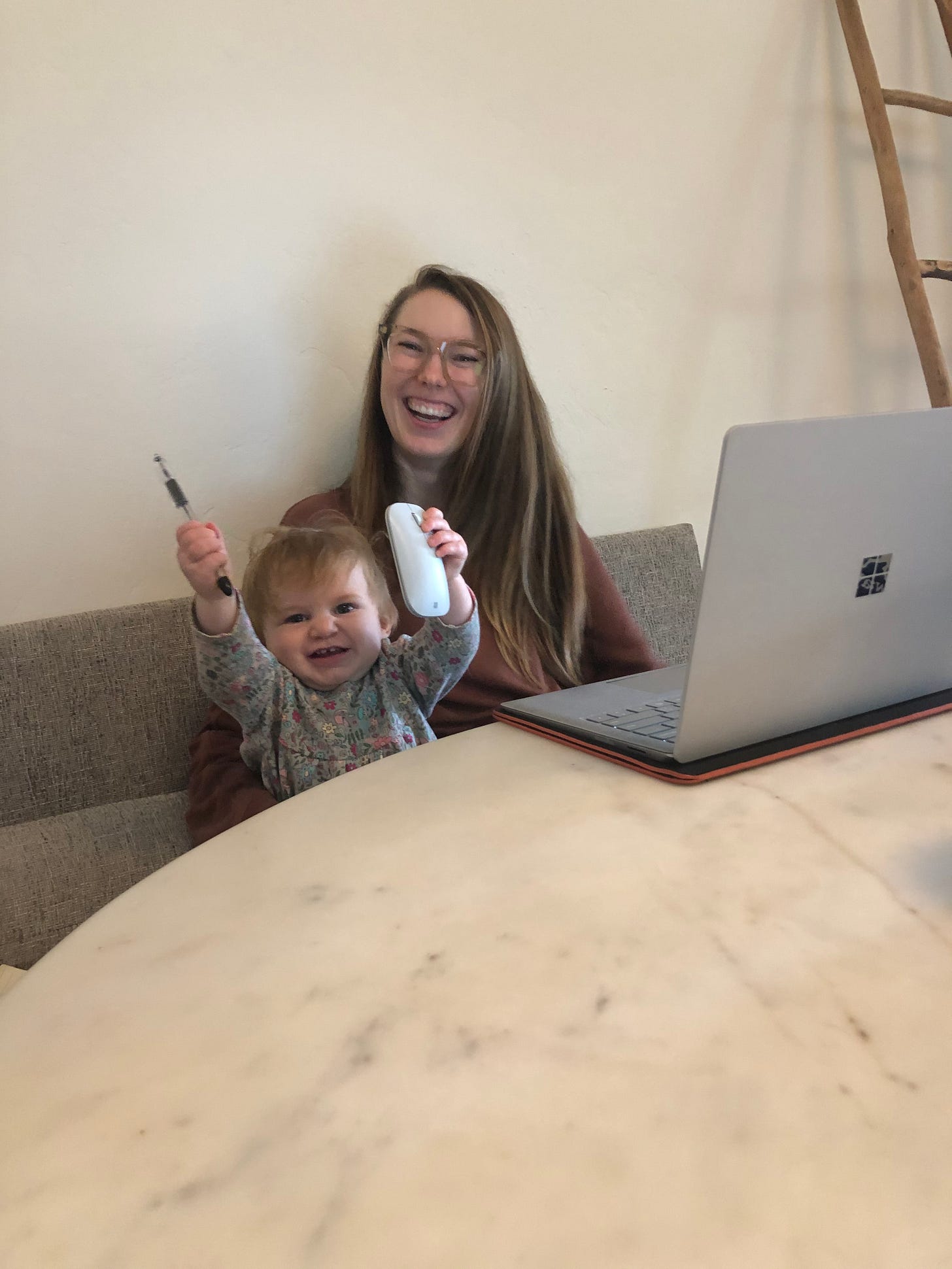
Adam: How much do you read in a day? Do you consider it “work” or more specifically do you consider it part of your work day?
Writing and reading never feel like work—I always do both for pleasure! (Though I think it’s also important for my work, and I do read before, during, and after my workday.)
Apart from the hour I spend reading Substack every morning, and the 2-3 hours I spend reading magazines on the weekends—I also subscribe to Kinfolk, Delayed Gratification, and Interview—I also read a lot throughout my day.
During those in-between moments when everyone looks at their phone I look at Substack. It is my go-to app whether I’m on the bus, waiting in line, or even doing yin yoga during my lunch break. I’ll read posts, check notifications, and comment on posts as I go about my day.
At night, I switch to fiction and read for an hour before bed, usually from 10pm to 11pm. I read Libby books on my phone using my Kindle app.
Tallying it all up, that means I spend about 20 hours writing and 20 hours reading every week. All because I decided 10 years ago that that would make my life a dream. And it has!
Best of all, last year I finally found the perfect place to put my writing—Substack—and I’m so grateful to be here.
Thanks for reading a million words about my writing rituals. Share yours in the comments!
Until next week,
Elle



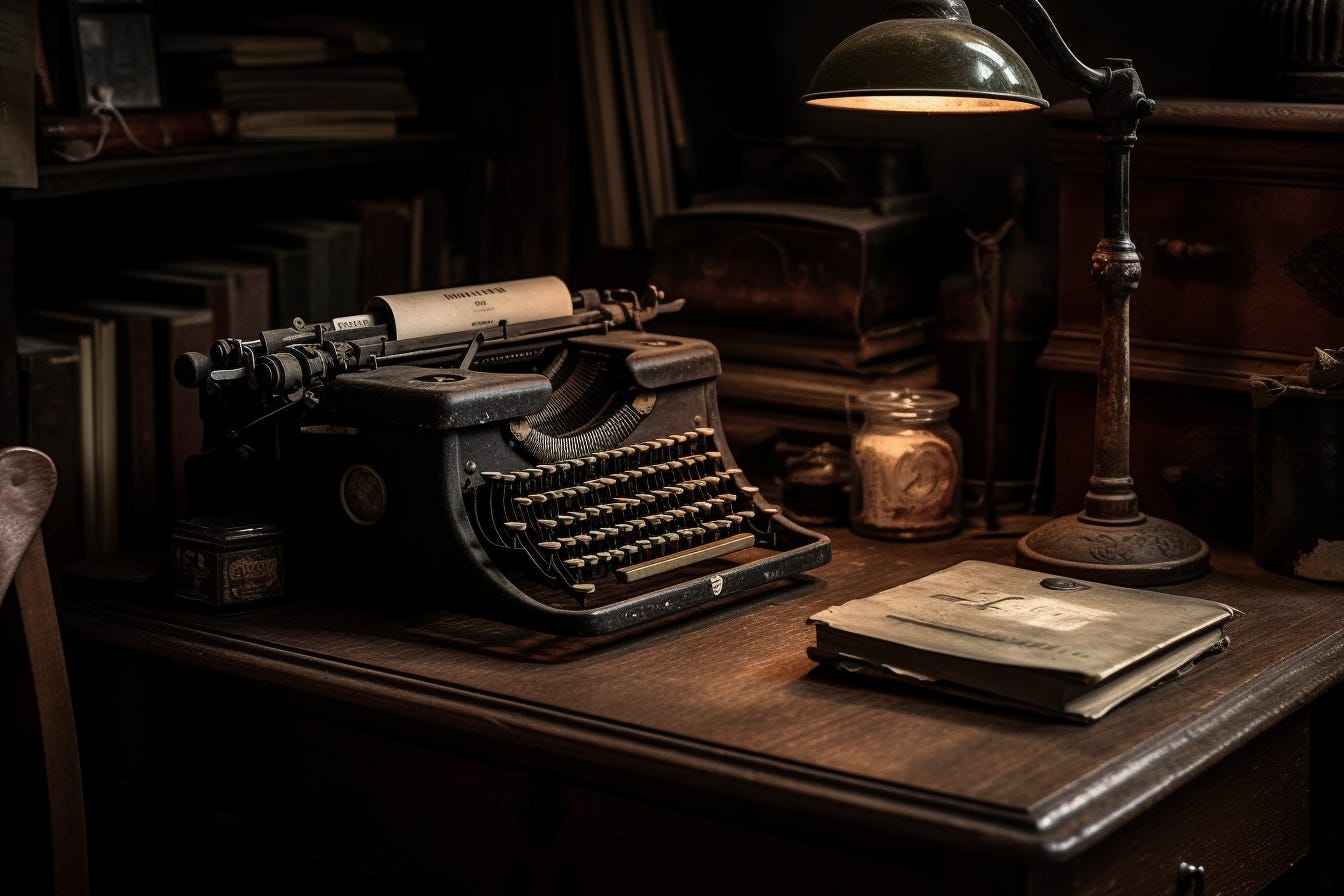
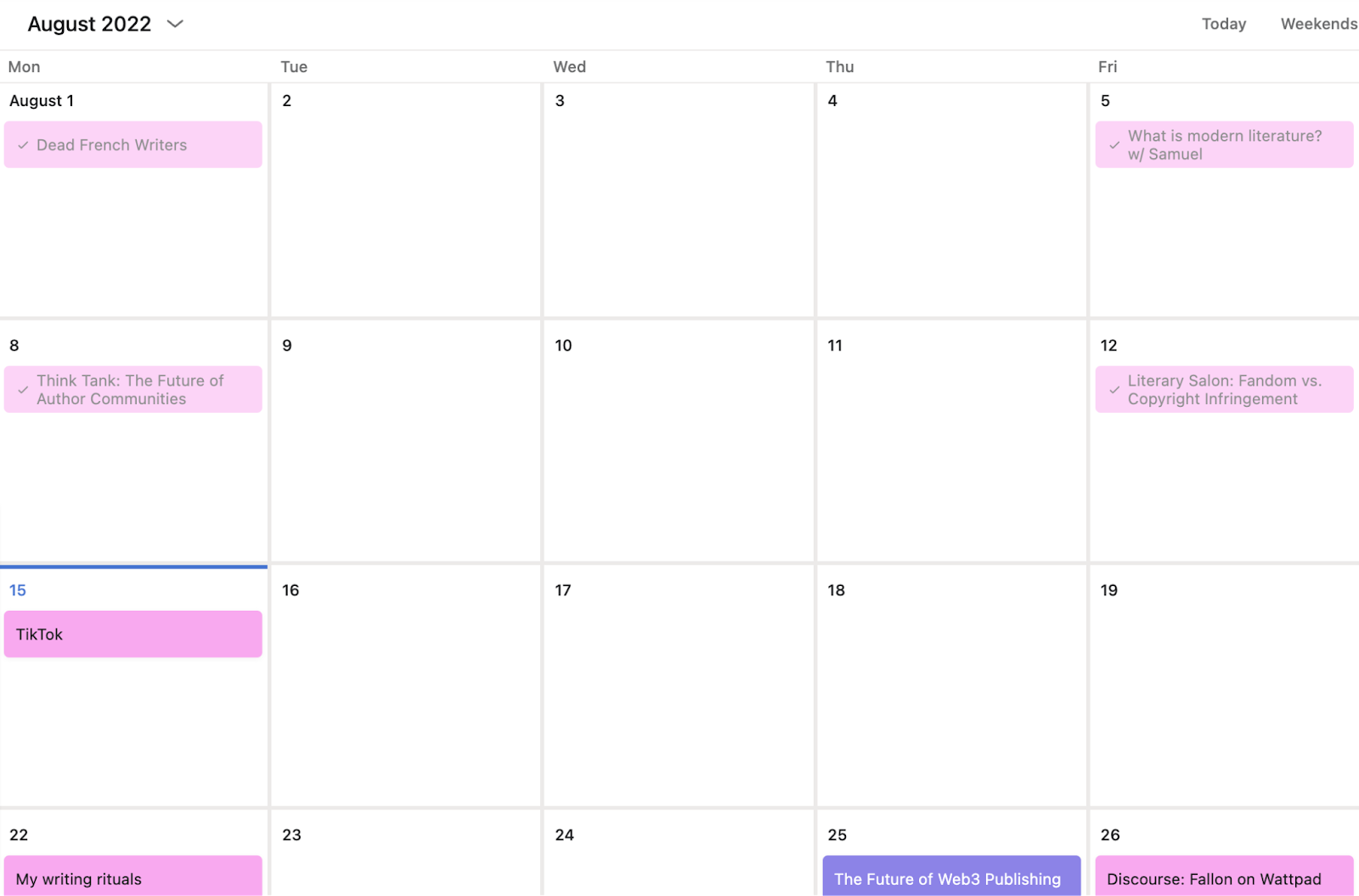
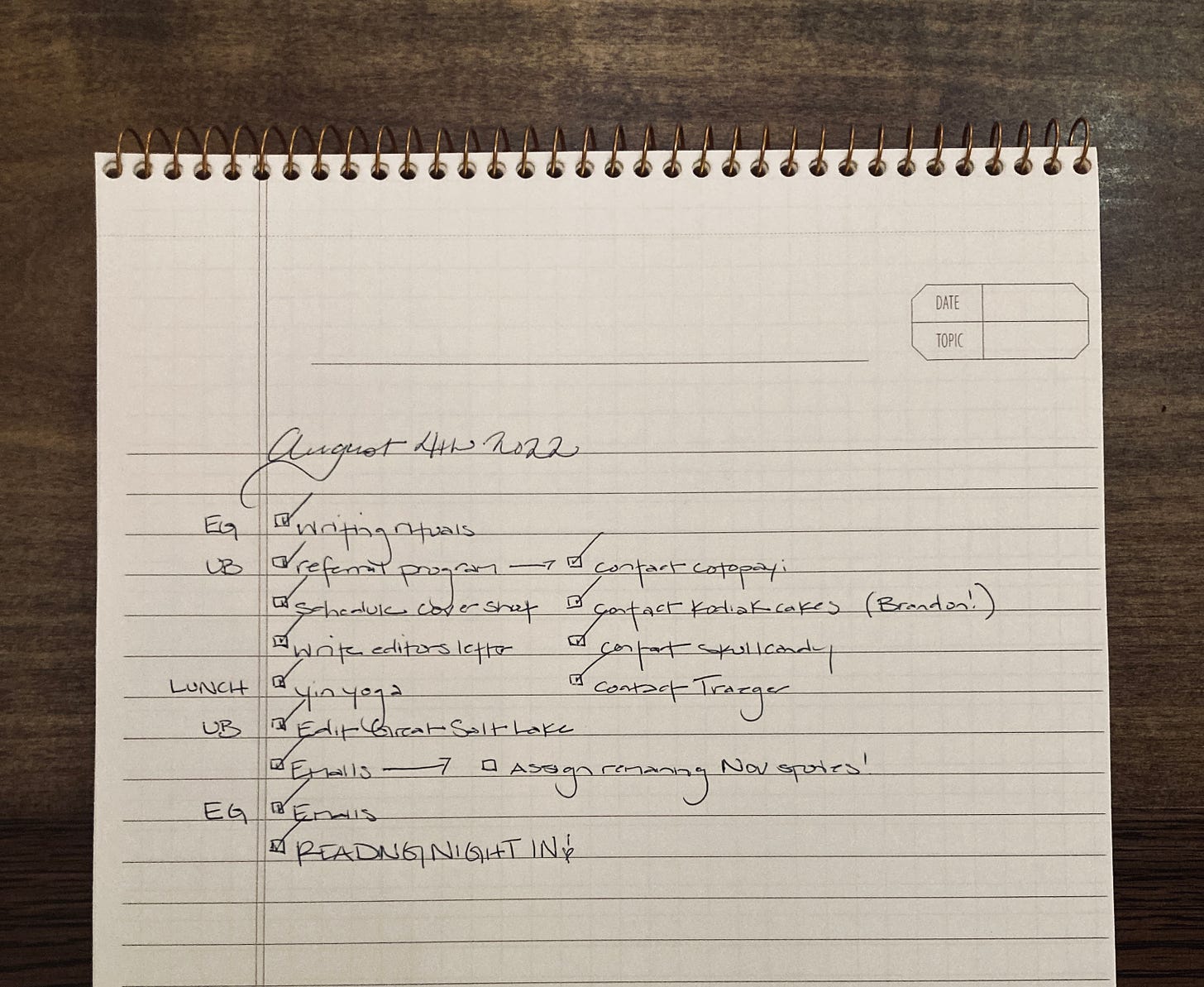
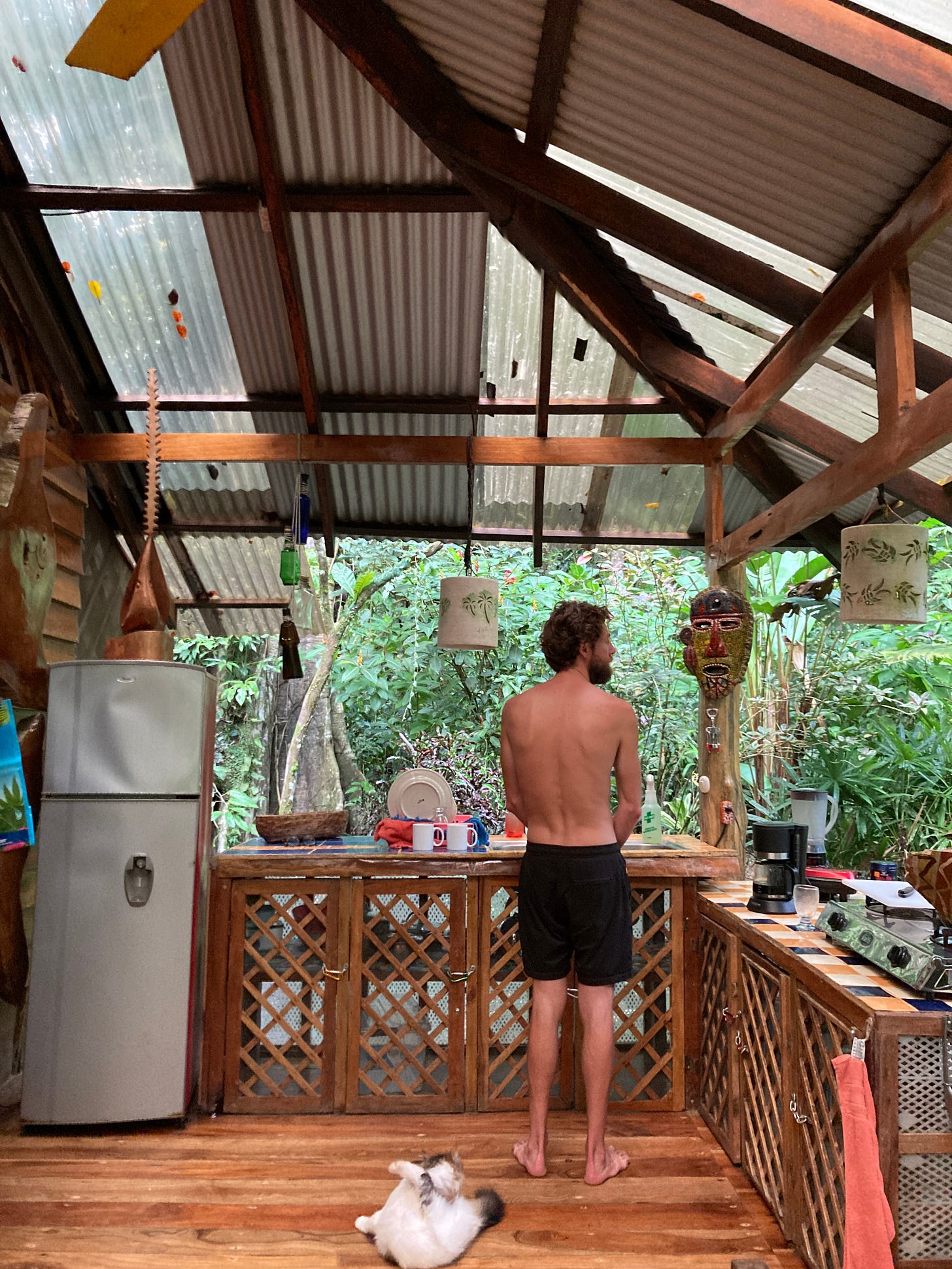
Thank you so much for sharing your rituals, Elle. This came at a perfect time for me. As a chronically ill writer, I've really struggled with finding the energy to scratch my writing itch (and y'know, do my work) without making myself unwell. I literally had to sit down with my husband at the weekend and come up with a plan so I can work more sustainably. It can be really challenging when your brain and your body just forces you to stop, but you kind of want to push through to finish what you're working on.
This week I'm starting to go back and experiment with routines and rituals that are flexible enough to me to work for when I'm not able to produce much at all, and I found a great deal of comfort and inspiration in reading about your routines. Thank you.
Love reading this. I'm a process/systems type, so always get frustrated when writers who publish are like, "I write, you know? For like hours." Not helpful.
Know what you mean about the 1st draft. Read something from Terry Pratchett, is that the 1st draft is you telling yourself the story. Blew my mind, and immediately made the initial drafts on subsequent scenes that much easier to do.